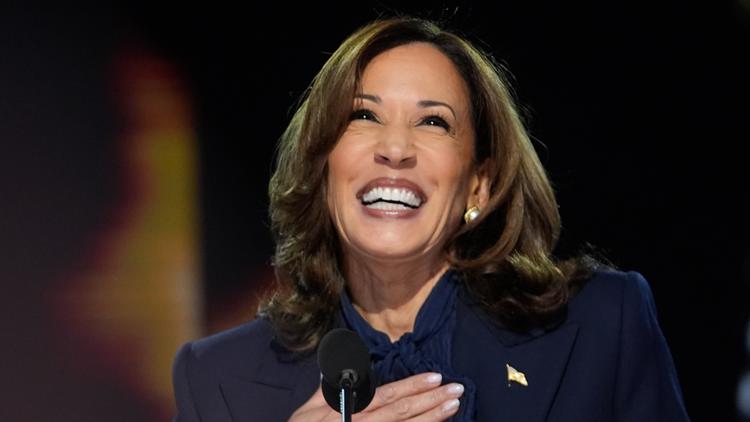CHICAGO — Kamala Harris summoned Americans on Thursday to reject political divisions and instead chart what she called a “new way forward,” accepting her party’s nomination with a speech that blended biography with warnings about electing Donald Trump again to the White House.
Taking the stage to a thunderous standing ovation as she closed out the Democratic National Convention in Chicago, the vice president argued that her personal story and prosecutorial background made her uniquely qualified to protect Americans' interests against a former president she cast as only having his own interests in mind.
“Our nation with this election has a precious, fleeting opportunity to move past the bitterness, cynicism, and divisive battles of the past,” Harris said. “A chance to chart a new way forward. Not as members of any one party or faction, but as Americans.”
The daughter of Jamaican and Indian immigrants, Harris became the first Black woman and person of South Asian descent to accept a major party’s presidential nomination. She would become the first female president if elected. Harris did not explicitly reference the historic firsts she would set in her 40-minute speech, and she only mentioned the words “Democrat” or “Republican” in the context of discussing a bipartisan border bill that Trump helped scuttle earlier this year.
Her speech — and the Democratic convention at large — was intended to appeal to a broad swath of Americans, not just partisans already energized by her ascension after President Joe Biden ended his reelection bid. She made several implicit appeals to centrists and Republicans disaffected with Trump, underscored by the appearances of several people who have broken with the 45th president, while embracing the policies and approach of Biden, the 46th.
She was joined for the traditional balloon drop by a large blended and mixed-race family. Earlier, two of her grandnieces had led the packed United Center in teaching people how to pronounce her name, which means lotus in Sanskrit.
“America, the path that led me here in recent weeks was no doubt unexpected. But I’m no stranger to unlikely journeys," she said.
Raised primarily by her mother in a small apartment in San Francisco’s East Bay after her parents’ divorce, Harris described being reared as well by friends and caregivers who were “family by love.” She also detailed a key part of her political origin story, when Wanda, her best friend from high school, confided in her that she was being abused by her stepfather and came to live with Harris' family.
“That is one of the reasons I became a prosecutor. To protect people like Wanda,” Harris said.
Outlining her career as a prosecutor, state attorney general, senator and now vice president, Harris said, “My entire career I’ve only had one client: the people." Meanwhile, she said Trump has only ever acted in the interests of "the only client he has ever had: himself.”
As she took the stage, she saw a sea of female delegates and Democratic supporters wearing white — the color of women’s suffrage, the movement that culminated with American women securing the right to vote in 1920.
Harris made a direct call to Republicans who don't support Trump to put aside party labels and to support her over Trump, who denied his loss to Biden in the 2020 election, which inspired the Jan. 6, 2021, Capitol insurrection.
“I know there are people of various political views watching tonight, and I want you to know I promise to be a president for all Americans,” Harris said. “I promise to be a president for all Americans to hold sacred America’s constitutional principles, fundamental principles, from the rule of law and fair elections to the peaceful transfer of power.”
The convention granted a prime speaking slot to former Rep. Adam Kinzinger of Illinois, a Republican critic of Trump’s who said: “Whatever policies we disagree on pale in comparison with those fundamental matters of principle. Of decency. Of fidelity to this nation. To my fellow Republicans: If you still pledge allegiance to those principles, I suspect you belong here, too.”
Harris invoked her prosecutor's background when she referred several times to Trump's "explicit intent” to free those who assaulted law enforcement officers at the Capitol, jail political opponents and use the military against American citizens.
“Consider what he intends to do if we give him power again,” she added.
Trump, calling into Fox News after Harris’ speech, responded to the speech by asking, “Why didn’t she do the things that she’s complaining about?”
“It was a lot of complaining. She didn’t talk about China. She didn’t talk about fracking. She didn’t talk about crime,” Trump went on, adding, “Other than that it was a nice-looking room.”
Harris has been criticized in the month since she replaced Biden atop the Democratic ticket for avoiding policy specifics. Her aides have signaled she has moved away from more liberal positions she took during her 2020 primary bid on fracking, immigration and other issues.
Delivering her most in-depth remarks on national security since becoming a presidential candidate, Harris promised to strengthen U.S. relationships with NATO allies and said the country must continue to support Ukraine in its war with Russia. Trump and running mate JD Vance have repeatedly questioned U.S. backing for Ukraine.
“I will never waver in defense of America’s security and ideals, because in the enduring struggle between democracy and tyranny, I know where I stand and I know where the United States belongs," she said.
The vice president also vowed to work toward an end to Israel’s war against Hamas that can stabilize the rest of the region, while not hesitating to protect U.S. forces from aggression by Iran and other adversaries.
While she pledged to “always stand up for Israel’s right to defend itself" after Hamas' Oct. 7 attack and pushed for the release of the hostages and the implementation of a cease-fire deal, she highlighted the plight of Palestinian civilians as well. Pro-Palestinian protesters and members of the “uncommitted” movement in the arena sharply criticized convention organizers for not inviting a Palestinian American onstage.
“What has happened in Gaza in the last 10 months is devastating, so many innocent lives lost,” Harris said. “Desperate, hungry people fleeing to safety over and over again. The scale of suffering is heartbreaking.”
Harris also offered broad promises in a string of key policy areas, pledging to better protect abortion access, expand voting rights, lower housing costs, empower the middle class with tax cuts and incentives and secure the border.
Harris' team has emphasized her law enforcement background, including her time as San Francisco district attorney and California attorney general. She was later elected to the U.S. Senate and sought the Democratic presidential nomination in 2020.
Her campaign imploded that year before a single primary vote was cast, but Biden chose her as his running mate, catapulting her to the national stage.
Although Harris initially struggled as vice president, her reputation grew when she became the administration's leading advocate for abortion rights after the U.S. Supreme Court overturned Roe v. Wade. Democrats harnessed anger over the decision to stem their losses in the last midterm elections.
When Biden stumbled in his debate with Trump in June, Harris defended him until he decided to drop out of the race. With the help of his endorsement, she swiftly unified the Democratic Party behind her candidacy, resetting a presidential race that Trump had appeared on track to win.



